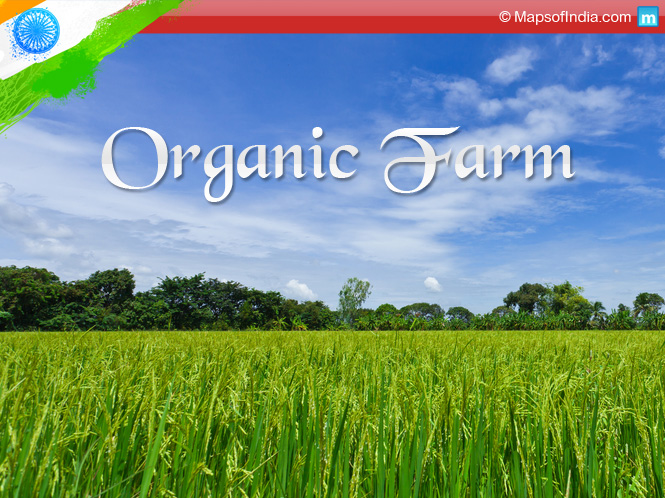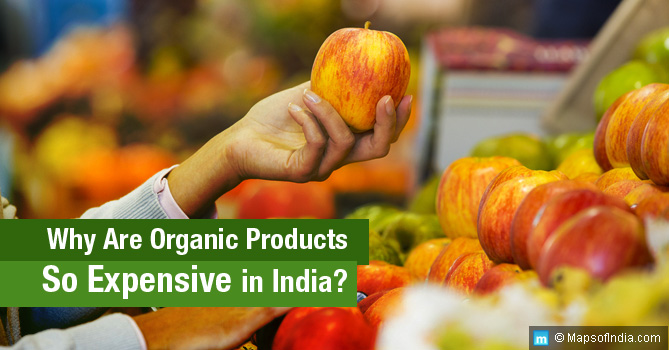
Farming in India was fundamentally organic till the middle of the twentieth century but industrial revolution; desire to make quick and more money and to get rid of pests, diseases and rodents brought in the concept of chemical farming after independence. Farmers started using chemical fertilizers to increase the produce and to meet the demands of growing population. Though initially it looked extensively amazing but its adverse affects started to appear in 1980s. Extensive use of fertilizers and pesticides created a resistant varieties of pests and diseases, its use polluted the underground water and even caused cancer and other such diseases in area where these have been used.
Health conscious people are looking for healthy options and shifting towards organic products. In a recent report by Yes Bank, rapid growth of 20% in organic food sector has been mentioned. Number of retail organic outlets in Mumbai is more than 100 whereas in Bangalore the number is more than 60.
The topic received recent attention because the Center is planning to promote organic farming in eastern India and wants to transform Bihar, Odisha, West Bengal and eastern Uttar Pradesh into an organic farming hub of India. This has been planned to provide much needed development opportunities to these states and chances to farmers to earn more. Apart from this farmers will be given soil cards for using right fertilizers and seeds. Pradhan Mantri Gram Sinchai Yojna on the lines of Pradhan Mantri Gram Sadak Yojna will also be launched to further boost the agriculture products in India.
So let us understand more about organic farming and check if it is a viable option or not.
In organic farming soil is considered as a living being that needs to be feed regularly with nutrients for enrichment. This method of farming does not use synthetic or chemical fertilizers and pesticides, plant growth regulators, and livestock feed additives. Crop rotation, animal manures, biofertilizers, and crop residue technique is used to maintain the soil fertility.
But there are many issues which must be tackled before opting the organic farming.
India is an immensely populated country and one-third of its countrymen still lives below the poverty line and does not get enough food to eat. Whether it is because of food shortage or distribution but problem is there. With organic farming, total produce will be far less than conventional farming. Consequently the problem to tackle the additional requirement must be addressed.
Weed, disease and pest control is really difficult by using organic methods hence chances of whole yield destruction are more. Though some options to control these are available in organic farming but the result is very slow and moreover it is crop and weather specific. Hence a solution must be ready in case of sudden outbreak of pest or disease.
It is generally said that organic produce is superior than conventional one. But there is no concrete proof to prove this. If conventional produce contains traces of chemicals and fertilizers then organic produce has harmful bacteria and organism which are not safe for consumption.
Organic food is good for health (as believed) so the produce is expensive than conventional one. But there are no distinguishing factors for the buyer to differentiate between the two. Hence chances of cheating are more in this case.
Period of 3-4 years is required to convert a field from conventional to organic. During this period the yield is low which means a financial setback to the farmers. But on the other hand it reduces the input cost and external cost, organic produce are sold at higher price, and over a period of time yield starts to increase. Government must consider all these factors and think about farmers.
There are many debatable questions like Can India produce enough organic produce to meet its needs?, Is organic produce better than conventional produce?. Is it possible that crop grown organically is laced with all the required nutrients?, Is organic farming a economically viable option?, Is it possible to control pest and diseases on time in organic farming?
Organical farming is beneficial as it gives competitive yield, improve soil’s condition, enhance bio-diversity, conserve water, increase food nutrient density, and reduce toxic loads in food. It is surely beneficial for the environment. Organic farming emits less CO2 in the atmosphere. Also nutrient recycling, pollination and habitats are more in this case.
But experts believe that large scale conversion is not feasible. Also converting the entire land and main produce from conventional to organic is not a viable option. There is a huge demand for Indian spices, tea, cotton, coffee etc which can be produced organically.
Another issue that needs to be addressed in India regarding this is of certification bodies and procedure. Though Certification Agencies are there but India needs to work towards this. At present the process of getting certificate is very expensive which stops small farmers to do organic farming. Also there is no standardization in terms of regulations. Some of the Indian Certification Agencies ECOCERT International, IMO India Pvt. Ltd, INDOCERT, LACON GmbH, SGS India Pvt. Ltd., and SKAL International.
In order to make a shift, India needs to make huge investments, government should provide subsidies to organic produce, farmers must be given training and education and there must be some changes in Certification systems.
Related Information:
Sikkim – India’s First Organic State
Soil Health Card Schemes for Indian Farmers
Pradhan Mantri Krishi Sinchai Yojana
PM Modi’s Agricultural Reforms Agenda
Major Soil Types
Soil Map of India
Causes of rural poverty and Anti poverty schemes in India
The Cotton Cultivation and Export Sector of India : An Overview
What is Kejriwal’s Gajendra Singh Kisan Sahayata Yojana?




